Regional Office, Tandojam
Introduction
Drainage and Reclamation Institute of Pakistan (DRIP) was established in 1975 under Pakistan Council of Research in Water Resources (PCRWR) with the mandate to conduct research in drainage and reclamation of waterlogged and salt affected soils. DRIP comprises on 40 acres land with multi facilities: Research Farm, Lysimeter Station, Office Block, Residential Colony, Mosque, Tile Drainage Machniary, Farm Implements, Seminar Hall and Library. The following are the specific objectives:
Objectives
- Drainage and reclamation of water logged and saline lands
- Irrigation scheduling and crop water requirements
- Surface and ground water resources monitoring and management
- Desertification control, rainwater harvesting and saline agriculture
- Soil and water quality analysis
- Coordination and working relationship with NGOS’s/INGO’s/public and private departments in water sector
- Documentation and dissemination of research findings to farming community/end users


| Officials | Designation | Qualification |
|---|---|---|

Hafiz Abdul Salam |
Director (Incharge) | B.E (Civil), M.E (Hydraulics & Irrigation) |

Engr. Nazar Gul |
Deputy Director Email : nazargul43@gmail.com |
Management of Saline-Sodic and Waterlogged Soils; Irrigation Water Management; Water-Salt-Fertilizer Balance Studies Through Lysimetric Setup |

Mr. Ghulam Mustafa |
Assistant Director | MSc. (Agriculture) |

Engr. Mir Sobdar Khan |
Research Officer | B.E (Electronics) |
 Engr. Muhammad Farooque |
Assistant Director | B.E (Civil), PGD.(Environmental Engineering & Management) |
 Mr. Abdul Jabbar Pathan |
Assistant Director | BSc., M.A |

Mr. Muhammad Moosa Jaagirani |
Assistant Director | B.A, DAE (Mechanical) |
 Engr. Izhar Hussain |
Assistant Director | BE (Civil), M.E |

Engr. Shahnawaz |
Assistant Director | B.E (Civil) M.E |
 Mr. Abdul Ghaffar |
Scientific Officer | MSc. |
 Ms. Nasreen Pathan |
Assistant Scientific Officer | M.Sc (Chem) |
 Mr. Pervez Ahmed |
Assistant Scientific Officer | Assistant Scientific Officer |
1. Tile Drainage Technology
DRIP is pioneer in Tile Drainage Technology. DRIP has its own tile drainage machinery. DRIP has successfully introduced and installed tile drainage technology on 1121 hectares on waterlogged and salt affected soils with active farmer’s participation.

2. Salt Affected Soils and Their Reclamation
DRIP undertook a program of research to solve the problems of soil salinity/sodicity in the Lower Indus Basin. In this context, several research studies are carried out on salt affected soils and their reclamation. The objectives of this research program were (i) to evolve cost-effective methods of reclamation of salt-affected soils, and (ii) use of saline groundwater for crop production. The following research studies have broadly been covered under three methods of reclamation including (i) reclamation by organic/inorganic, physical, and cultural practices (ii) biological reclamation of saline-sodic soil, (iii) Irrigation practices effect on soil salinity (iv) Management of reclaimed land.
3. Electrical Resistivity Survey (ERS)
To identify the fresh groundwater pockets in Sindh, Electrical Resistivity Survey(ERS) has been used. The DRIP office has equipment called Terra Meter used for groundwater investigation. This office is providing consultancy to different public and private organizations for identification and demarcation of groundwater quality.
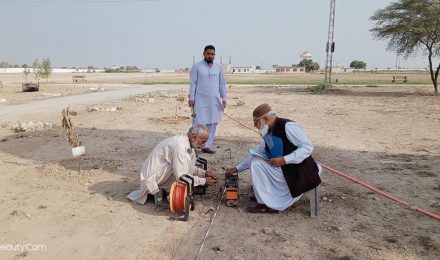
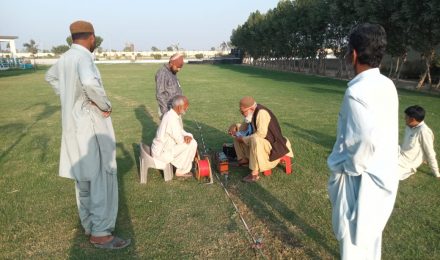
4. Research and Demonstration (R&D) Farm
The research activities at R&D farm (22 acres) of DRIP are focused on crop water requirement and water conservation techniques to enhance the water productivity. The farm has attractive orchards of Mango, Guava, Lemon, and Jujube. This office has conducted research on wheat, cotton, sugarcane and banana on raised beds, bed & furrow, ridges and disseminated to the farmers for broader adaptation.
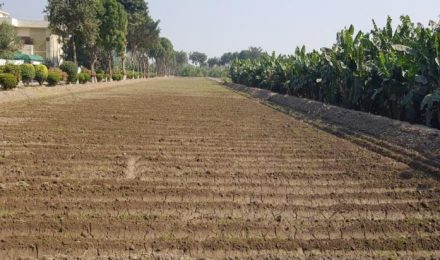

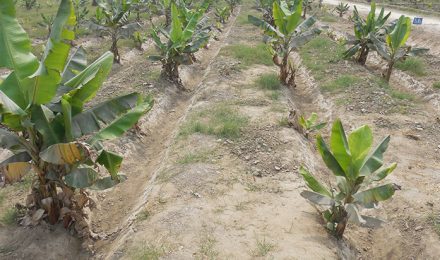

5. Lysimeteric Studies
DRIP has state of art Lysimeter Station. The water requirement of the major crops of Sindh province namely wheat, cotton, sugarcane, rice, rapeseed – mustard, chili, sesame and sunflower have been determined through lysimeter.
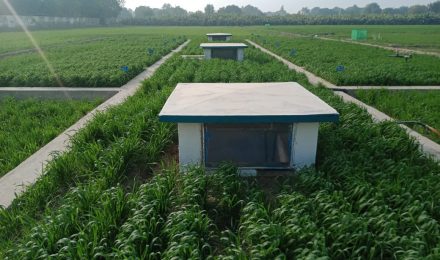
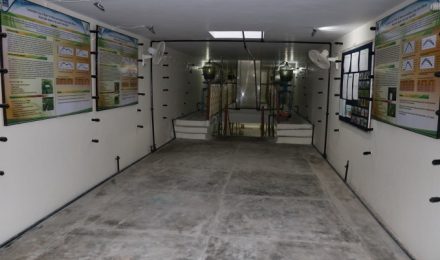

6. Agro Meteorological Station
An agro-meteorological station was established in March 1986 at DRIP. Meteorological parameters such as temperature, relative humidity, pan-evaporation, wind velocity, wind direction, sunshine hours, precipitation, wet and dry bulb temperatures etc. are recorded and compiled on regular basis. Potential or reference evapotranspiration (ETo) are calculated on daily and hourly basis using Modified Penman equation. The data is shared with different research organizations and university students in pursuing their research work for Master or PhD degrees.

Field Research Station, Mithi
The DRIP has established the Field Research Station comprising 200 acres at Khario Nara, Mithi. The station is located at Chailhar road about 12 km away in North of District Mithi. The research activities are desertification control, rainwater harvesting, saline agriculture, rangeland management, pitcher irrigation system and conjunctive use of rain and ground water. Two rainwater harvesting ponds, tube well and fish farm have been developed at Field Station, Mithi.
Rainwater Harvesting Ponds
Two rain water harvesting ponds (150ft x 150ft x 20ft) each in size have been developed in the farm. The storage capacity of each pond is 12742 m3 with 3,366,080 US gallons. Both ponds are providing with silt trap channel, animal reservoir and, water depth measuring gauge.

Solar Tubewell
The tube well installed at 76 m depth with EC 9.0 dS/m under the PSDP project Combating Drought and Desertification in the Thar Desert. The same tube well is converted into solar under another PSDP project Exploration of Exploration of Groundwater Potential and Promotion of Interventions for Rainwater Harvesting and Biosaline Agriculture in Tharparkar Desert. The water obtained from the tube well is mainly used for saline agriculture and to supply water to the fish farm. This tube well also feed approximately 5000 livestock and 2000 population from surrounding 5 villages on daily basis.

Pitcher Irrigation System
The pitcher irrigation system is installed under the shed on an area of 30 x30 ft. Soil of the area is sandy in nature as well as very poor in organic matter and other fertility ingredients. Seasonal vegetables of different kinds are being grown on experimental basis and successful results are achieved.

Saline Agriculture
Under saline agriculture, the salt tolerant crops/trees are grown through saline water at Field Station, Mith. Different fruit plants like jujube, Guava, Falsa, Jaman, Cheekoo, and lemon, and date Palm are grown at the Station

Fish Farm
With the financial assistance of The Asia Foundation (TAF) a fish pond (60ft × 40ft x 7.5ft) is constructed under the project “Piloting Climate Smart Aquaculture in Tharparkar for Local Food Security” at Field Research Station, Mithi. The aim of the project is to promote food security options in Mithi, Tharparkar through aquaculture and effective use of land and water resources to the local community. About 40 fish fingerlings of different variety like Thaila, Silver carp are stocked into the Fish farm. The farm yard manure, fish feed and dry meal is applied in the pond to feed the fish fingerlings.

Soil and Water Quality Laboratory
The Soil and Water Quality Testing Laboratory at DRIP Tando Jam providing the services for analysis of soil and water. The laboratory is equipped with soil and water testing facility.The water quality laboratory is equipped with water testing facility of the following important parameters:
Physical Parameters: Colour, Odour, Taste, pH, Turbidity and Total Suspended Solids (TSS).
Chemical Parameters: Alkalinity, Ammonia, Bicarbonate, Calcium, Carbonate, COD, BOD, Chloride, Total Dissolved Solids (TDS)/Conductivity, Nitrate, Nitrite, Phosphate, Free Chlorine, Hardness, DO, Total Chlorine, Sulphate, Sodium, and Potassium.
Trace Elements: Arsenic, Copper, Fluoride, Iron, Lead, Manganese and Zinc.
Microbiological Parameters: Coliform and E.coli.
Soil Parameters: ECe, pH, CO3, HCO3, Cl, SO4, Ca+Mg, Na, K, SAR, ESP, soil textural analysis (relative percentage of sand, silt and clay particles).
Water Quality Laboratories
The Water Quality Laboratories at Tando Jam, Hyderabad and Shaheed Benazir Abad are under the administrative control of DRIP Regional Office.These Labs are providing service to the public and private sectors for water quality analysis. The Soil and Water Quality Laboratory at Tando Jam is equipped with the state of art equipment’s and qualified trained staff to carry out the soil and water analysis.
.
Documentation and Dissemination
The drainage and reclamation technologies developed by DRIP have proved highly useful, to achieve a significant increase in the yield of crops and economic returns from the farms. Documentation and dissemination of research findings/results, in the form of brochures, booklets and documentaries to the farming community/end users, through farmer field days, expert field visits, seminars, workshops etc. is a regular activity of DRIP.
Library
The Institute has a modest but a specialized library holding of about 4000 books, journals and technical reports on agriculture, irrigation, drainage, land reclamation and related fields. Domestic as well as foreign journals create an added interest. Bibliographies on land and water development are also available. The services of this library are also available to out door researchers and students.



Advisory Services
The advisory services are provided to the concerned farmers/end users/beneficiaries/stake holders regarding crop water requirement, best water management practices, reclamation of water logged and saline soils, surface and ground water quality analysis.

